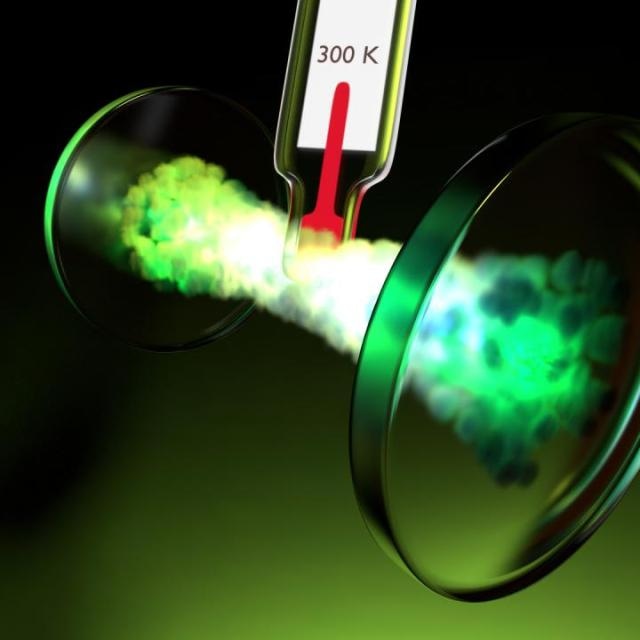Apr 20 2016
Liquid water is a very good heat storage medium – anyone with a Thermos bottle knows that. However, as soon as water boils or freezes, its storage capacity drops precipitously. Physicists at the University of Bonn have now observed very similar behavior in a gas of light particles. Their findings can be used, for example, to produce ultra-precise thermometers. The work appears in the prestigious technical journal "Nature Communications".
 Prof. Martin Weitz's team at the Institute of Applied Physics of the University of Bonn has measured the temperature of a gas of light, when it condenses. The thermometer should be understood only figuratively, because, the temperature was determined by recording the wavelengths of the light. (Credit: © Image: Tobias Damm)
Prof. Martin Weitz's team at the Institute of Applied Physics of the University of Bonn has measured the temperature of a gas of light, when it condenses. The thermometer should be understood only figuratively, because, the temperature was determined by recording the wavelengths of the light. (Credit: © Image: Tobias Damm)
Water vapor becomes liquid under 100 degrees Celsius – it condenses. Physicists speak of a phase transition. In this process, certain thermodynamic characteristics of the water change abruptly. For instance, at a single stroke, twice as much heat energy can be stored than in the gaseous state.
Light consists of tiny indivisible portions, the photons. Under certain conditions, they, too, can condense, if they are cooled enough. Many thousands of these light packets then suddenly fuse into a kind of super-photon with unusual characteristics – a so-called Bose-Einstein condensate.
Photon gas also changes heat storage characteristics abruptly
The physicists at the University of Bonn have now been able to show that the photon gas at this phase transition behaves according to the theoretical predictions of Bose and Einstein: Similar to water, it abruptly changes its heat storage capacity, meaning the ability to store thermal energy. "This behavior was already known from condensed atoms", explains Prof. Dr. Martin Weitz of the Institute of Applied Physics. "However, this is the first time that this phenomenon has been demonstrated for a condensate of light".
Atoms, too, form a Bose-Einstein condensate, when they are cooled greatly and enough of them are simultaneously concentrated in a small space. They then suddenly become indistinguishable: They act like a single giant atom. Twenty years ago, physicists already demonstrated that the heat capacity of atoms suddenly changes at this phase transition. How strong this change is, however, can be measured only imprecisely for atoms. "In our condensate, this can be done substantially better", emphasizes Dr. Jan Klärs, who has since moved from Bonn to ETH Zurich.
The heat capacity of a material is calculated from the energy needed to heat it by one degree. Usually this is done by measuring the temperature of the substance before and after adding a defined amount of energy. However, the temperature of a gas of light can not be measured with a thermometer; but that is also not necessary. "In order to determine the temperature of the gas, it is only necessary to know the different wavelengths of the light particles – the distribution of its colors", says Klärs. And this can be determined with extreme precision with the methods available today.
"Our findings for the change in the heat capacity at the transition from photon gas to Bose-Einstein condensate match the theoretical predictions exactly", explains Tobias Damm of the Institute of Applied Physics. "The precision of this method is so high that it is very suitable for precision measurement of certain natural thermodynamic constants".
The heat content of the photon gas changes not only upon condensation to a super-photon, but also continuously with the ambient temperature. The Bonn physicists therefore hope that their findings can also be used to build high-precision thermometers.
Publication: Tobias Damm, Julian Schmitt, Qi Liang, David Dung, Frank Vewinger, Martin Weitz, & Jan Klärs: Calorimetry of a Bose-Einstein-condensed photon gas; Nature Communications, DOI: 10.1038/NCOMMS11340
Source: https://www.uni-bonn.de/